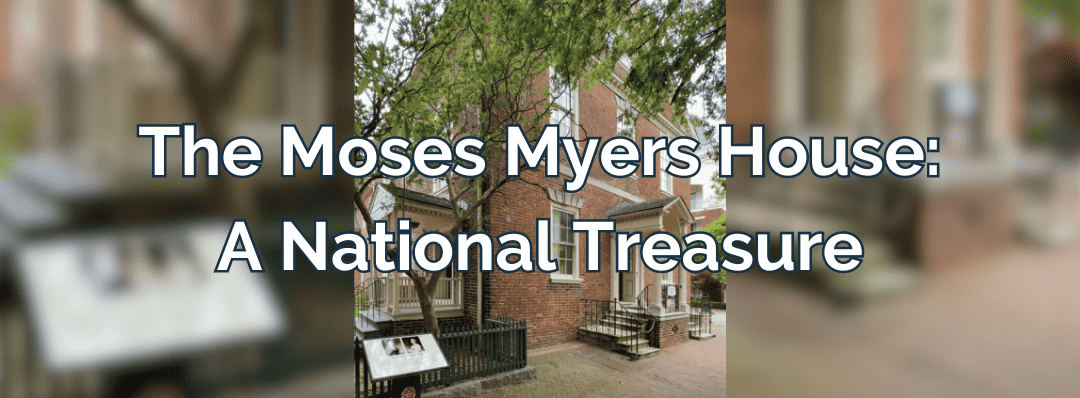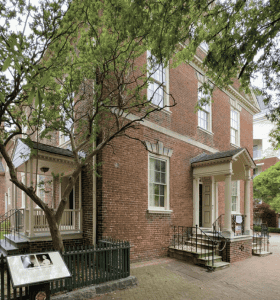Last fall, members of the Norfolk City Council discussed selling four city-owned properties in order to save the expense of maintaining them. Three of them are historic homes. One is the Moses Myers House.
According to a November 29, 2022 article in the Virginian-Pilot, Council members seemed unanimous in support-ing the idea. No action has been taken, but more than one possibility has been mentioned, including turning the house into a bed and breakfast.
Who was Moses Myers? What is the Moses Myers House and why is it import-ant? Can anything be done to save it? Is this just an issue for the region’s Jewish community, or is it an issue for the entire American Jewish community? For that matter, is it only a Jewish issue?
Moses Myers: Entrepreneur, patriot, family man
Born in 1753, Moses Myers was descended on his mother’s side from a Jewish family that had lived in Colonial America since the 1680’s. A businessman, who saw service during the American Revolution, Moses and his wife, Eliza, moved to Norfolk in 1787 following business losses which may have been at least partially the result of the war. They became the first permanent Jewish residents of Tidewater.
Upon settling in Norfolk, Myers reestablished his import-export business and served the community in various positions, including as a member, and at one point president, of the city’s Common Council (precursor of the current City Council), consul to France and the Netherlands, superintendent of the Norfolk branch of the Bank of Richmond, and founder of the Norfolk Chamber of Commerce.
According to one biography, he also provided “financial support to the Presbyterian Church and donated land on which a theater was built.”
Although Myers’ Import-export business went through periods of decline, according to his 1835 obituary in the Richmond Enquirer, he became “the most extensive merchant South [sic] of the Potomac.” His friends included fellow-Virginians Thomas Jefferson and James Monroe.
Moses and Eliza raised nine children in Tidewater. They also provided a home for the son of a good friend. Young David Yulee lived with the family and went to school in Norfolk for eight years. Yulee grew up to become the first person of Jewish birth to be elected to the United States Senate.
Moses Myers House
The Myers’ home, built in 1792, is one of the earliest brick structures built after fire destroyed most of Norfolk in 1776. Owned by the city of Norfolk and managed by the Chrysler Museum for more than 70 years, the house is a living museum, open to the public for individuals, field trips, and programming. Listed on both the Virginia Landmarks Register and the National Register of Historic Places, it is believed to be the second oldest home of a Jewish family in the United States. It may be the oldest that was solely used as a Jewish family’s residence, and it was owned by the family for several generations.
According to information submitted to the National Register, it is “the most intact and best documented surviving residence of a Jewish family in the United States from the late eighteenth and early nineteenth centuries; in fact, the house is the best surviving example of a known Jewish residence in the United States of any period before 1800.” It’s also a rare example of an urban historic home, in contrast to the many plantations and country homes in the state, some of which are here in Hampton Roads.
The home is a beautiful example of Federal architecture. The interior, complete with furnishings, a majority of which are original to the family, is stately and gracious. It provides a tangible illustration of how prominent Americans, both Jews and non-Jews, lived in the late 1700’s and early 1800’s. According to the Chrysler Museum website, “most of the house has been restored to reflect its 19th century appearance.” A central entrance leads to a parlor, dining room, and music room. The upper levels contain bedrooms for the Myers’ large family.
According to the Society of Architectural Historians, the house was “a showcase for the latest American, English, and French fashions,” with furniture, some of which was “custom made for the house, including the sideboards in the dining room and the window seats in the front parlor.”
The importance of this historic home
The value of the Moses Myers House extends beyond its fine example of Federal architecture, its magnificent examples of period furniture, and the importance of the family and its history. It is also significant for the way in which it represents the the city in which it is located.
According to Virginia Whealton, assistant professor in the Department of History of Texas Tech University, “in 1800, Norfolk was the 10th largest city in the United States.” Whealton, whose post-doctoral fellowship has enabled her to study the Myers family and its legacy, notes that “no city in Virginia, including Richmond, before or since ever has ranked that highly.” That is a history to be proud of, and it is a history to preserve. The Moses Myers House, as a part of that history, has value that cannot be overstated.
It is its value, however, as an important landmark for the Tidewater Jewish community and the larger American Jewish community that makes this historic house unique. In 1800, eight years after the Meyers moved into their new home, the Jewish population of the country totaled 2,000 – 2,500. Most American Jews resided in the new country’s most populace cities: in the North, in cities such as New York and Philadelphia, and in the South, in cities such as Savannah and Charleston.
Yet, the Myers family, like other pioneering Jewish Americans who settled in communities in which they were in the minority, was able to make an indelible impact on the community in which they lived. Their presence here and the contributions they made to the larger Tidewater community have been an example to the many generations of American Jews who have chosen to make this region their home in the following two and a half centuries.
What can be done
Of the four properties that the city of Norfolk is thinking of selling, only the Moses Myers House has been maintained as a living museum. The Norfolk Historical Society recognizes the unique value of the home and submitted a pro-posal in December that the City sell the other three properties and use the proceeds as “seed funding” for an endowment for the Moses Myers House. The Society has offered to meet with representatives of the City and other interested persons to “develop a strategy” to create the endowment and raise additional funds as needed. As of this writing, the City has not responded to the proposal put forward by the Norfolk Historical Society. Neither has the issue been decided.
According to the American Association for State and Local History, historic home museums “provide a forum and a place to connect historical, social, and cultural issues with contemporary counterparts. They inspire us to think about and act on those issues in our own lives and communities.” The Moses Myers House, and the experience of the Myers family, are a source of pride for Jewish Tidewater and the wider community. They reinforce an understanding of why the American Jewish experience is unique. In a time of polarization and social change, historic homes provide a window into an earlier era that reminds how the community and nation have changed, and how they have stayed the same. The Moses Myers House, as the oldest Jewish family home in the country, provides a reminder of the important role American Jews have played in America’s history.
-Alice Titus


